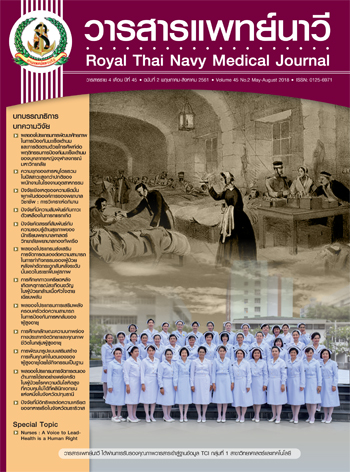การศึกษาลักษณะความบกพร่องทางประสาทจิตวิทยาและคุณภาพชีวิตในกลุ่มผู้สูงอายุ
Main Article Content
บทคัดย่อ
การวิจัยนี้มีวัตถุประสงค์ เพือศึกษาลักษณะความบกพร่องทางประสาทจิตวิทยาและคุณภาพชีวิตในกลุ่มผู้สูงอายุ จำานวน 56 คน ที่เกษียณอายุราชการจากกองทัพเรือซึ่งเป็นสมาชิกชมรมผู้สูงอายุใน อ.สัตหีบ จ.ชลบุรี โดยแบ่งเป็นสองกลุ่มอายุ คือ กลุ่มที่มีอายุระหว่าง 60 - 69 ปี (n = 28) และ 70 ปีขึ้นไป (n = 28) แบ่งเป็นเพศชาย 50% และเพศหญิง 50% โดยเป็นการศึกษาเชิงบรรยายแบบภาคตัดขวางในกลุ่มผู้สูงอายุที่เกษียณอายุราชการจากกองทัพเรือ คัดเลือกกลุ่มตัวอย่างแบบระดับชั้น โดยการทดสอบลักษณะทางประสาทจิตวิทยาและคุณภาพชีวิต จำานวน 7 ชุด 1) ทดสอบความสามารถด้านบริหารจัดการใช้แบบทดสอบ Wisconsin Card Sorting Test (WCST), Behavioural Assessment of Dysexecutive Syndrome (BADS), Stroop Color Interference, และ Tower of London (ToL) 2) ความสามารถด้านทักษะพิสัย ใช้แบบทดสอบ Trail Making Test (TMT) 3) ด้านความจำา ใช้ชุดทดสอบย่อยของแบบทดสอบ Wechsler Memory Scale (WMS-III) ได้แก่ Logical Memory I และ II, Spatial Span และ Letter-Number Sequencing และ 4) คุณภาพชีวิต ใช้แบบประเมินคุณภาพชีวิตไทยแบบรูปภาพ (PTQL) วิเคราะห์เปรียบเทียบลักษณะความบกพร่องทางประสาทจิตวิทยาทั้งสองกลุ่มอายุทดสอบโดยใช้สถิติ Independent t-test หาความสัมพันธ์ระหว่างลักษณะความบกพร่องทางประสาทจิตวิทยากับคุณภาพชีวิตทดสอบโดยใช้สถิติ Pearson product moment correlation coefficient
ผลการศึกษา พบว่า ผู้สูงอายุทั้งสองกลุ่มมีความสามารถด้านบริหารจัดการแตกต่างกันอย่างมีนัยสำาคัญทางสถิติ ในด้านที่เกี่ยวข้องกับความยืดหยุ่นในการคิด การแก้ไขปัญหา การวางแผน และการคิดริเริ่ม นอกจากนี้ยังพบว่า ผู้สูงอายุกลุ่ม 70 ปีขึ้นไป ทำาคะแนนได้ต่ำากว่ากลุ่มอายุ 60 - 69 ปี ในด้านทักษะพิสัยเมือประเมินด้วยแบบทดสอบ TMT อย่างไรก็ตาม ไม่พบความแตกต่างอย่างมีนัยสำาคัญทางสถิติในทั้งสองกลุ่มอายุในด้านความจำาทุกด้าน และไม่พบความสัมพันธ์ระหว่างลักษณะความบกพร่องทางประสาทจิตวิทยากับคุณภาพชีวิต การศึกษานี้แสดงให้เห็นว่า การเป็นผู้สูงอายุมีความสัมพันธ์กับลักษณะความบกพร่องทางประสาทจิตวิทยา โดยเฉพาะความสามารถด้านบริหารจัดการและความสามารถด้านทักษะพิสัย ดังนั้นการตรวจวินิจฉัยทางประสาทจิตวิทยาจึงมีความสำาคัญต่อการพัฒนากลยุทธ์ในการป้องกันความเสี่ยงของภาวะสมองเสือมและเป็นประโยชน์ต่อการพัฒนารูปแบบการบำาบัดรักษาเพือส่งเสริมหรือคงระดับความสามารถทางประสาทจิตวิทยาและคุณภาพชีวิตในผู้สูงอายุได้
Article Details

อนุญาตภายใต้เงื่อนไข Creative Commons Attribution-NonCommercial-NoDerivatives 4.0 International License.
เอกสารอ้างอิง
2. Wirojratana V, Amnatsatsue K, Sasat S, Malathum P, Narongsak J. Improvement of healthcare services for dependent elders. Thai Journal of Nursing Council 2014;29(3):104-15. (in Thai)
3. Ravdin LD, Katzen HL. Handbook on the neuropsychology of aging and dementia. New York: Spring Science Business Media; 2013
4. Kirova AM, Bays RB, Lagalwar S. Working memory and executive function decline across normal aging, mild cognitive impairment, and Alzheimer’s disease. Biomed Res Int 2015:748212
5. Lin H, Chan RC, Zheng L, Yang T, Wang Y. Executive functioning in healthy elderly Chinese people. Arch Clin Neuropsychol 2007;22(4):501-11
6. Forte R, Boreham CA, De Vito G, Pesce C. Health and quality of life perception in older adults: the joint role of cognitive efficiency and functional mobility. Int J Environ Res Public Health 2015;12(9):11328-44
7. Chan RC, Xu T, Li HJ, Zhao Q, Liu HH, Wang Y, et al. Neurological abnormalities and neurocognitive functions in healthy elder people: a structural equation modeling analysis. Behav Brain Funct 2011;7(1):32
8. Doorduin JV. Cognition: not a determinant of health related quality of life in middle to old aged men. [Master’s Thesis]. Utrecht University; 2011
9. Bielderman A. Active aging and quality of life: community-dwelling older adults in deprived neighborhoods. Groningen: Gildeprint Drukkerijen; 2016
10. Kawai Y, Miura R, Tsujimoto M, Sakurai T, Yamaoka A, Takeda A, et al. Neuropsy- chological differentiation between Alzheimer’s disease and dementia with Lewy bodies in a memory clinic. Psychogeriatrics 2013;13(3):157-63
11. MacPherson SE, Phillips LH, Della Sala S. Age, executive function, and social decision making: a dorsolateral prefrontal theory of cognitive aging. Psychol Aging 2002;17(4):598-609
12. Allain P, Nicoleau S, Pinon K, Etcharry-Bouyx F, Barre J, Berrut G, et al. Executive functioning in normal aging: a study of action planning using the Zoo Map Test. Brain Cogn 2005;57(1):4-7
13. Peters R. Ageing and the brain. Postgrad Med J 2006;82(964):84-8
14. Shilling VM, Chetwynd A, Rabbitt PM. Individual inconsistency across measures of inhibition: an investigation of the construct validity of inhibition in older adults. Neuropsychologia 2002;40(6):605-19
15. Kowalczyk A, MaDonald S, Cranney J, McMahon M. Cognitive flexibility in the normal elderly and in persons with dementia as measured by the written and oral Trail Making Tests. Brain Impair 2001;2(1):11-21
16. Woods DL, Wyma JM, Herron TJ, Yund EW. The effects of aging, malingering, and traumatic brain injury on computerized Trail-Making Test performance. PLoS One 2015;10(6):e0124345
17. Kennedy KM, Raz N. Aging white matter and cognition: differential effects of regional variations in diffusion properties on memory, executive functions, and speed. Neuropsychologia 2009;47(3):916-27
18. Genziani M, Stewart R, Bejot Y, Amieva H, Artero S, Ritchie K. Subjective memory impairment, objective cognitive functioning and social activity in French older people: findings from the three cities study. Geriatr Gerontol Int 2013;13(1):139-45
19. Munro CA, Winicki JM, Schretlen DJ, Gower EW, Turano KA, Munoz B, et al. Sex differences in cognition in healthy elderly individuals. Neuropsychol Dev Cogn B Aging Neuropsychol Cogn 2012;19(6):759-68
20. Meguro K, Shimada M, Yamaguchi S, Ishizaki J, Ishii H, Shimada Y, et al. Cognitive function and frontal lobe atrophy in normal elderly adults: implications for dementia not as aging-related disorders and the reserve hypothesis. Psychiatry Clin Neurosci 2001;55(6):565-72
21. Lima-Silva TB, Yassuda MS. The relationship between memory compliants and age in normal aging. Dement Neuropsychol 2009;3(2):94-100
22. Elosua MR, Ciudad MJ, Contreras MJ. Gender differences in verbal and visuospatial working memory tasks in patients with mild cognitive impairment and Alzheimer’s disease. Dement Geriatr Cogn Dis Extra 2017;7(1):101-8
23. Davis JC, Bryan S, Li LC, Best JR, Hsu CL, Gomez C, et al. Mobility and cognition are associated with wellbeing and health related quality of life among older adults: a cross-sectional analysis of the Vancouver falls prevention cohort. BMC Geriatr 2015 Jul5;15:75
24. Amer M, Akkad R, Hassan H. Is cognition a determinant of health related quality of life in community dwelling non demented elderly?. Adv Aging Res 2014;3(5):339-48
25. Savirasarid N. The selected factors related to quality of life of elderly people in Bangkok. [Master’s Thesis, Faculty of Medicine Siriraj Hospital]. Mahidol University; 2008. (in Thai)

